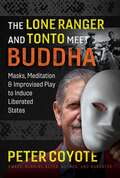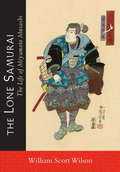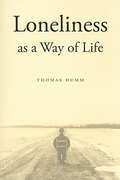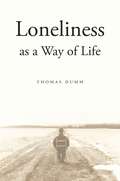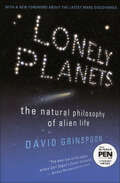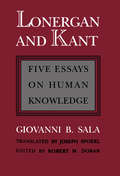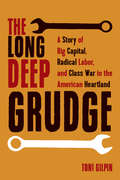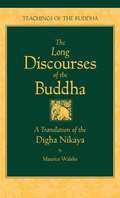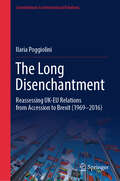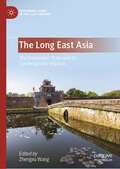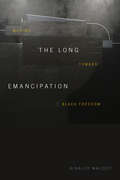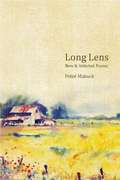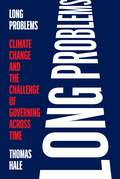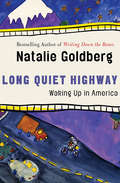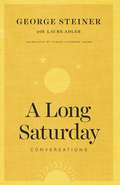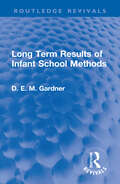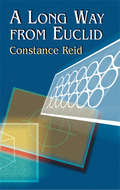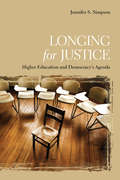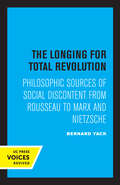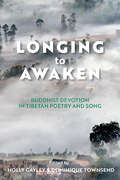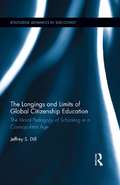- Table View
- List View
The Lone Ranger and Tonto Meet Buddha: Masks, Meditation, and Improvised Play to Induce Liberated States
by Peter Coyote• Shares a series of mindfulness techniques and improv exercises with masks to suppress the ego, calm the mind, and allow spontaneous playfulness and spaciousness to arise from your deepest nature • Draws on Buddhist philosophy to describe how and why the exercises work • Woven throughout with a lighthearted parable of an overweight and out-of-work Lone Ranger and Tonto who meet Buddha and experience spiritual awakeningSharing a series of mindfulness techniques and acting exercises that show how malleable the self can be, award-winning actor, narrator, and Zen Buddhist priest Peter Coyote reveals how to use masks, meditation, and improvisation to free yourself from fixed ideas of who you think you are and help you release your ego from constant defensive strategizing, calm the mind&’s overactivity, and allow spontaneous playfulness to arise out of your deepest nature. Developed through 40 years of research and personal study, Coyote&’s synthesis of mask-based improv games and Zen practices is specifically designed to create an ego-suppressed state akin to the mystical experiences of meditation or the spiritual awakenings of psychedelics. After preparatory exercises, seeing yourself in a mask will temporarily displace your familiar self and the spirit of the mask will take over. Likening the liberated state induced by mask work to &“Enlightenment-lite,&” Coyote draws on Buddhist philosophy to describe how and why the exercises work as well as how to make your newly awakened and confident self part of daily life. In true Zen form, woven throughout the narrative is a lighthearted parable of an out-of-work Lone Ranger and Tonto, who meet Buddha and experience spiritual awakening. Illuminating the lessons of mask work, the transformation of the Lone Ranger mirrors that of the individual pursuing this practice, revealing how you will come to realize that the world is more magical and vaster than you thought possible.
The Lone Samurai: The Life of Miyamoto Musashi
by William Scott WilsonMiyamoto Musashi (1584?1645) was the legendary samurai known throughout the world as a master swordsman, spiritual seeker, and author of the classic book on strategy, the Book of Five Rings. Over 350 years after his death, Musashi and his legacy still fascinate us and continue to inspire artists, authors, and filmmakers. Here, respected translator and expert on samurai culture William Scott Wilson has created both a vivid account of a fascinating period in feudal Japan and a portrait of the courageous, iconoclastic samurai who wrestled with philosophical and spiritual ideas that are as relevant today as they were in his time. For Musashi, the way of the martial arts was about mastery of the mind rather than simply technical prowess--and it is this path to mastery that is the core teaching in his Book of Five Rings. This volume includes supplemental material on Musashi's legacy as a martial arts icon, his impact on literature and film, and the influence of his Book of Five Rings.
Loneliness as a Way of Life
by Thomas DummThe modern individual, Dumm suggests, is fundamentally a lonely self. Through reflections on philosophy, political theory, literature, and tragic drama, he proceeds to illuminate a hidden dimension of the human condition.
Loneliness as a Way of Life
by Thomas Dumm“What does it mean to be lonely?” Thomas Dumm asks. His inquiry, documented in this book, takes us beyond social circumstances and into the deeper forces that shape our very existence as modern individuals. The modern individual, Dumm suggests, is fundamentally a lonely self. Through reflections on philosophy, political theory, literature, and tragic drama, he proceeds to illuminate a hidden dimension of the human condition. His book shows how loneliness shapes the contemporary division between public and private, our inability to live with each other honestly and in comity, the estranged forms that our intimate relationships assume, and the weakness of our common bonds. A reading of the relationship between Cordelia and her father in Shakespeare’s King Lear points to the most basic dynamic of modern loneliness—how it is a response to the problem of the “missing mother.” Dumm goes on to explore the most important dimensions of lonely experience—Being, Having, Loving, and Grieving. As the book unfolds, he juxtaposes new interpretations of iconic cultural texts—Moby-Dick, Death of a Salesman, the film Paris, Texas, Emerson’s “Experience,” to name a few—with his own experiences of loneliness, as a son, as a father, and as a grieving husband and widower. Written with deceptive simplicity, Loneliness as a Way of Life is something rare—an intellectual study that is passionately personal. It challenges us, not to overcome our loneliness, but to learn how to re-inhabit it in a better way. To fail to do so, this book reveals, will only intensify the power that it holds over us.
Lonely Planets: The Natural Philosophy of Alien Life
by David GrinspoonPEN Literary Award Winner: &“The best, most entertaining examination of the possibility of other life in the universe since [Carl] Sagan&’s best work.&” —Boulder Daily Camera It&’s been decades since Carl Sagan first addressed the general public about the possibility of extraterrestrial life from a scientist&’s perspective. We&’ve learned a lot in those years, and now planetary scientist David Grinspoon investigates the big questions: How widespread are life and intelligence in the cosmos? Is life on Earth an accident, or in some sense the &“purpose&” of this universe? And how can we, working from the Earth-centric definition of &“life,&” even begin to think about the varieties of life-forms on other planets? In accessible, lively prose, and using the topic of extraterrestrial life as a mirror with which to view human beliefs, evolution, history, and aspirations, Grinspoon takes us on a three-part journey—the history of our expanding awareness of other planets and our ideas on alien life dating back to the earliest days of astronomy; the science of cosmic evolution and the evolution of life on Earth, including a critique of the &“Rare Earth hypothesis&”; and the beliefs that humans hold, addressing the limits of our ability to conceptualize or communicate with intelligent aliens and the scientific and philosophical implications of far-future evolutionary possibilities. Rich in personal and often amusing anecdotes, Lonely Planets explores the shifting boundary between planetary science and natural philosophy, and reveals how the search for extraterrestrial life unites our spiritual and scientific quests for connection with the cosmos. Includes a new foreword about recent Mars discoveries &“An outstanding introduction to cosmic evolution.&” —San Jose Mercury News &“[A] terrific book.&” —San Diego Union-Tribune &“A personable chat on life, the universe and everything.&” —Publishers Weekly
Lonergan and Kant
by Giovanni B. SalaLonergan's Insight has frequently been compared with Kant's Critique of Pure Reason. Giovanni B. Sala, an internationally acknowledged Kant scholar, contrasts the cognitional theory of his former teacher Lonergan with the positions of Kant that have proved so influential, and in many ways so intractable, over the past two centuries.The first essay is one of the most influential papers ever written on Lonergan; it and the second one inquire into the notion of the a priori. The third essay presents a detailed analysis of Kantian intuitionism and contrasts it with the `knowledge as structure' position of Lonergan's critical realism. In this essay intuitionism is generalized, to allow Sala to address representatives of neoscholasticism as well. The argument with neoscholasticism continues in the fourth essay. The final paper discusses Kant's resolution of the question regarding the agreement of a priori concepts with things, and finds in Lonergan's work an alternative position on correspondence and truth. Each essay is a model of careful and thorough scholarship, and also - surprising in a book of such proportions - of clarity. Lonergan appeals several times in Insight to the device of `Clarification by Contrast.' Sala's essays show us in intricate detail how illuminating such comparisons can be.
Lonergan in the World
by James MarshIn his philosophical classic Insight, Catholic philosopher and theologian Bernard Lonergan introduced the concept of self-appropriation - the personal search for knowledge of the self, and through that of the world - as the basis for systematic philosophical investigation.In Lonergan in the World, James L. Marsh argues, clearly and passionately, that self-appropriation can serve as the basis for philosophical, ethical, and even political and economic thought. Comparing and applying Lonergan's principles to major trends in contemporary philosophy, including phenomenology, hermeneutics, postmodernism, analytic philosophy, and Marxism, Marsh uncovers the philosophical and the socio-political implications of Lonergan's work and its value as the basis for a search for justice and self-understanding.Drawing on Marsh's more than forty years of studying and teaching Lonergan's thought, Lonergan in the World is a book that should be read not just by philosophers and theologians, but by anyone interested in the philosophical foundations of a just and authentic life.
Lonergan on Philosophic Pluralism
by Gerard WalmsleyIn his influential philosophical work Insight, Bernard Lonergan made the intriguing and problematic claim that "the polymorphism of consciousness is the one and only key to philosophy." In Lonergan on Philosophical Pluralism, Gerard Walmsley examines Lonergan's many discussions of the different forms of human consciousness, as well as his sustained responses to the problems raised by philosophical and cultural pluralism. Looking closely at Lonergan's thoughts on patterns of experience, different levels of consciousness, and the differentiations of consciousness that occur through the historical development of individual human minds, Walmsley shows how polymorphic consciousness allows individuals to understand a range of philosophical positions. By understanding this range, an individual is able to sympathetically and critically appreciate different positions. Testing the strength of Lonergan's position, he directly engages postmodern thought and comparative philosophy to demonstrate that Lonergan's account of polymorphic consciousness provides a better basis for a positive evaluation of difference than does the work of many postmodern thinkers. An ambitious and soundly argued work, Lonergan on Philosophical Pluralism is both an illuminating study of Lonergan's thought, and an intriguing proposal for how difference and pluralism can be understood.
The Long Deep Grudge: A Story of Big Capital, Radical Labor, and Class War in the American Heartland
by Toni Gilpin&“The definitive history of an important but largely forgotten labor organization and its heroic struggles with an icon of industrial capitalism.&” —Ahmed A. White, author of The Last Great Strike This rich history details the bitter, deep-rooted conflict between industrial behemoth International Harvester and the uniquely radical Farm Equipment Workers union. The Long Deep Grudge makes clear that class warfare has been, and remains, integral to the American experience, providing up-close-and-personal and long-view perspectives from both sides of the battle lines. International Harvester—and the McCormick family that largely controlled it—garnered a reputation for bare-knuckled union-busting in the 1880s, but in the twentieth century also pioneered sophisticated union-avoidance techniques that have since become standard corporate practice. On the other side the militant Farm Equipment Workers union, connected to the Communist Party, mounted a vociferous challenge to the cooperative ethos that came to define the American labor movement after World War II. This evocative account, stretching back to the nineteenth century and carried through to the present, reads like a novel. Biographical sketches of McCormick family members, union officials and rank-and-file workers are woven into the narrative, along with anarchists, jazz musicians, Wall Street financiers, civil rights crusaders, and mob lawyers. It touches on pivotal moments and movements as wide-ranging as the Haymarket &“riot,&” the Flint sit-down strikes, the Memorial Day Massacre, the McCarthy-era anti-communist purges, and America&’s late twentieth-century industrial decline. &“A capitalist family dynasty, a radical union, and a revolution in how and where work gets done—Toni Gilpin&’s The Long Deep Grudge is a detailed chronicle of one of the most active battlefronts in our ever-evolving class war.&” —John Sayles
The Long Discourses of the Buddha: A Translation of the Digha Nikaya (The Teachings of the Buddha)
by Ajahn Sumedho Maurice WalsheThis book offers a complete translation of the Digha Nikaya, the long discourses of the Buddha, one of the major collections of texts in the Pali Canon, the authorized scriptures of Theravada Buddhism. This collection--among the oldest records of the historical Buddha's original teachings, given in India two and a half thousand years ago--consists of thirty-four longer-length suttas, or discourses, distinguished as such from the middle-length and shorter suttas of the other collections. These suttas reveal the gentleness, compassion, power, and penetrating wisdom of the Buddha. Included are teachings on mindfulness (Mahasatipatthana Sutta); on morality, concentration, and wisdom (Subha Sutta); on dependent origination (Mahanidrana Sutta); on the roots and causes of wrong views (Brahmajala Sutta); and a long description of the Buddha's last days and passing away (Mahaparinibbana Sutta); along with a wealth of practical advice and insight for all those travelling along the spiritual path. Venerable Sumedho Thera writes in his foreword: "[These suttas] are not meant to be 'sacred scriptures' that tell us what to believe. One should read them, listen to them, think about them, contemplate them, and investigate the present reality, the present experience, with them. Then, and only then, can one insightfully know the truth beyond words." Introduced with a vivid account of the Buddha's life and times and a short survey of his teachings, The Long Discourses of the Buddha brings us closer in every way to the wise and compassionate presence of Gotama Buddha and his path of truth.
The Long Disenchantment: Reassessing UK-EU Relations from Accession to Brexit (1969–2016) (Contributions to International Relations)
by Ilaria PoggioliniThis book seeks to replace a comforting European narrative of British missed opportunities with a chronicle of the complexity of UK/EC-EU relations. After nearly a decade of Brexit (2016), it revisits the historical evolution of the relationship between Britain and Europe since the 1970s. Building on an in-depth study of primary and secondary sources, the author sheds new light on the intricacies of that relationship. The book is structured in six chapters, the first of which reflects on the causes of the UK's lack of engagement in the early and crucial developments of the European Community. The second chapter revisits ten years of stop-go diplomacy of accession, and the meaning of the first enlargement for Britain and its partners. The third chapter argues that in the early years, entry represented for Britain an opportunity to deliver change, working with France and Germany inside the EC; and, as an EC member, building new relationships with countries outside, including in the Commonwealth. The fourth chapter focuses on the dawning realisation that EC membership meant for Britain joining its partners on a journey towards an unknown destination in search of whatever-closer Union would mean. The Fifth chapter concentrates on the 1980s, when, on the one hand, the British government was to the fore in the creation of a single market; while on the other it openly challenged an agreed-upon narrative, among the continental member states. This narrative was one which sought to reshape European values and relationships, together with its culture, geography and history, round a commitment to greater integration. The final chapter is an epilogue that examines the political decisions of the last four British prime ministers: Major, Brown, Blair and Cameron, in confronting and reacting to the reality of European Union, from the Maastricht Treaty (1992) onward. This examination suggests that, rather than political continuity, discontinuity, led the UK, through Prime Minister David Cameron's efforts at renegotiation in the EU, to Brexit, and his instant resignation. This book invites readers to rethink, refine, and challenge the dominant narrative of Britain as a predictable, permanent outsider condemned to irrelevance in the EC/EU. It will appeal to scholars of international relations and political history, as well as political decision-makers, both in Britain and the EU.
The Long East Asia: The Premodern State and Its Contemporary Impacts (Governing China in the 21st Century)
by Zhengxu WangThis book brings together a range of studies that aim at illustrating the ideas, institutions, historical patterns, and contemporary relevance of the social-political system that existed in the main part of East Asia during the premodern era. This is most often known as the Confucian literati-bureaucratic state, the imperial Chinese bureaucratic state, or the Confucian-Legalist state, that was established and endured most notably in China, but also in several East Asian societies such as Korea, Vietnam, Japan. That state and sociopolitical system also greatly shaped state making in several kingdoms in the region – such as Ryukyu and Dali – which were later merged into larger polities. Illuminating the significance of these historical patterns for today, this book will interest political scientists, historians, philosophers, and the general public.
The Long Emancipation: Moving toward Black Freedom
by Rinaldo WalcottIn The Long Emancipation Rinaldo Walcott posits that Black people globally live in the time of emancipation and that emancipation is definitely not freedom. Taking examples from across the globe, he argues that wherever Black people have been emancipated from slavery and colonization, a potential freedom has been thwarted. Walcott names this condition the long emancipation—the ongoing interdiction of potential Black freedom and the continuation of the juridical and legislative status of Black nonbeing. Stating that Black people have yet to experience freedom, Walcott shows that being Black in the world is to exist in the time of emancipation in which Black people must constantly fashion alternate conceptions of freedom and reality through expressive culture. Given that Black unfreedom lies at the center of the making of the modern world, the attainment of freedom for Black people, Walcott contends, will transform the human experience worldwide. With The Long Emancipation, Walcott offers a new humanism that begins by acknowledging that present conceptions of what it means to be human do not currently include Black people.
Long Lens: New and Selected Poems (American Poets Continuum)
by Peter Makuck"Peter Makuck sees through the detritus of daily life to what matters. . . . It’s that essence that lives deep down in things, looked for in people, sea- and landscapes, and creatures, that lifts the quotidian toward the marvelous, and animates this selection of poems from four decades."—Brendan GalvinFrom "Long Lens":Folding laundry, I can see our clotheslinewaving its patches of color like the flagof a foreign country where I had happily livedin a small clapboard house surrounded by pines.I can hear my mother in her strong accentsaying she didn’t want a dryereven when we could finally afford one—Our sheets won’t smell of trees and sunlight anymore.Long Lens represents forty years of Peter Makuck’s work, including twenty-five new poems. With precise language, Makuck’s imagery evokes spiritual longing, love, loss, violence, and transcendence. His subjects include the aftermath of the 1970 killings at Kent State University; scuba diving on an offshore shipwreck; flying through a storm in a small plane; rescuing a boy caught in a riptide; and lucid observations of spinner sharks, a gray fox, a spider, and a pelican tangled in a fishing line.Peter Makuck taught at East Carolina University from 1976 to 2006, where he founded Tar River Poetry. He was 2008 Lee Smith Chair in Creative Writing at North Carolina State University. Winner of the Brockman Award and the Charity Randall Citation, he lives on Bogue Banks, one of North Carolina’s barrier islands.
Long Lens
by Peter Makuck"Peter Makuck sees through the detritus of daily life to what matters. . . . It's that essence that lives deep down in things, looked for in people, sea- and landscapes, and creatures, that lifts the quotidian toward the marvelous, and animates this selection of poems from four decades."--Brendan GalvinFrom "Long Lens":Folding laundry, I can see our clotheslinewaving its patches of color like the flagof a foreign country where I had happily livedin a small clapboard house surrounded by pines.I can hear my mother in her strong accentsaying she didn't want a dryereven when we could finally afford one--Our sheets won't smell of trees and sunlight anymore.Long Lens represents forty years of Peter Makuck's work, including twenty-five new poems. With precise language, Makuck's imagery evokes spiritual longing, love, loss, violence, and transcendence. His subjects include the aftermath of the 1970 killings at Kent State University; scuba diving on an offshore shipwreck; flying through a storm in a small plane; rescuing a boy caught in a riptide; and lucid observations of spinner sharks, a gray fox, a spider, and a pelican tangled in a fishing line.Peter Makuck taught at East Carolina University from 1976 to 2006, where he founded Tar River Poetry. He was 2008 Lee Smith Chair in Creative Writing at North Carolina State University. Winner of the Brockman Award and the Charity Randall Citation, he lives on Bogue Banks, one of North Carolina's barrier islands.
Long Problems: Climate Change and the Challenge of Governing across Time
by Thomas HalePolitical strategies for tackling climate change and other &“long problems&” that span generationsClimate change and its consequences unfold over many generations. Past emissions affect our climate today, just as our actions shape the climate of tomorrow, while the effects of global warming will last thousands of years. Yet the priorities of the present dominate our climate policy and the politics surrounding it. Even the social science that attempts to frame the problem does not theorize time effectively. In this pathbreaking book, Thomas Hale examines the politics of climate change and other &“long problems.&” He shows why we find it hard to act before a problem&’s effects are felt, why our future interests carry little weight in current debates, and why our institutions struggle to balance durability and adaptability. With long-term goals in mind, he outlines strategies for tilting the politics and policies of climate change toward better outcomes.Globalization &“widened&” political problems across national boundaries and changed our understanding of politics and governance. Hale argues that we must make a similar shift to understand the &“lengthening&” of problems across time. He describes tools and strategies that can, under certain conditions, allow policymakers to anticipate future needs and risks, make interventions that get ahead of problems, shift time horizons, adapt to changing circumstances, and set forward-looking goals that endure. As the climate changes, politics must, too. Efforts to solve long-term problems—not only climate change but other issues as well, including technology governance and demographic shifts—can also be a catalyst for a broader institutional transformation oriented toward the long term. With Long Problems, Hale offers an essential guide to governing across time.
Long Quiet Highway: Waking Up in America
by Natalie GoldbergThe author of Writing Down the Bones shares her story of self-discovery through Zen Buddhism, in &“beautiful and simple prose&” (Library Journal). In this autobiographical work, Natalie Goldberg takes us on a journey from her suburban childhood to her maturation as a writer. From the high-school classroom where she first listened to the rain, to her fifteen years as a student of Zen Buddhism, Natalie Goldberg&’s path is by turns illuminating, disciplined, heartbreaking, hilarious, and healing. Along the way she reflects on her life and work in prose that is both elegant and precise, reminding the reader of what it means to be fully alive. This ebook features an illustrated biography of Natalie Goldberg, including rare photos and never-before-seen documents from the author&’s personal collection.
A Long Saturday: Conversations
by George Steiner Laure AdlerGeorge Steiner is one of the preeminent intellectuals of our time. The Washington Post has declared that no one else “writing on literature can match him as polymath and polyglot, and few can equal the verve and eloquence of his writing,” while the New York Times says of his works that “the erudition is almost as extraordinary as the prose: dense, knowing, allusive.” Reading in many languages, celebrating the survival of high culture in the face of modern barbarisms, Steiner probes the ethics of language and literature with unparalleled grace and authority. A Long Saturday offers intimate insight into the questions that have absorbed him throughout his career. In a stimulating series of conversations, Steiner and journalist Laure Adler discuss a range of topics, including Steiner’s boyhood in Vienna and Paris, his education at the University of Chicago and Harvard, and his early years in academia. Books are a touchstone throughout, but Steiner and Adler’s conversations also range over music, chess, psychoanalysis, the place of Israel in Jewish life, and beyond. Blending thoughts on subjects of broad interest in the humanities—the issue of honoring Richard Wagner and Martin Heidegger in spite of their politics, or Virginia Woolf’s awareness of the novel as a multivocal form, for example—with personal reflections on life and family, Steiner demonstrates why he is considered one of today’s greatest minds. Revealing and exhilarating, A Long Saturday invites readers to pull up a chair and listen in on a conversation with a master.
Long Term Results of Infant School Methods (Routledge Revivals)
by D.E.M. GardnerFirst published in 1950, Long Term Results of Infant School Methods was written to explain and summarise the results of Gardner’s experiment to test the extent to which the effect of different styles of Infant school education, "experimental" or "control", would also be apparent at a later stage. The book details how the tests and the schools involved were chosen; the different types of tests conducted and their respective aims; and a summary of Gardner’s conclusions. It will appeal to those with an interest in the history and theory of education.
Long Wars and the Constitution
by Stephen M. GriffinIn a wide-ranging constitutional history of presidential war decisions from 1945 to the present, Stephen M. Griffin rethinks the long-running debate over the imperial presidency and concludes that the eighteenth-century Constitution is inadequate to the challenges of a post-9/11 world. The Constitution requires the consent of Congress before the United States can go to war. Truman’s decision to fight in Korea without gaining that consent was unconstitutional, says Griffin, but the acquiescence of Congress and the American people created a precedent for presidents to claim autonomy in this arena ever since. The unthinking extension of presidential leadership in foreign affairs to a point where presidents unilaterally decide when to go to war, Griffin argues, has destabilized our constitutional order and deranged our foreign policy. Long Wars and the Constitution demonstrates the unexpected connections between presidential war power and the constitutional crises that have plagued American politics. Contemporary presidents are caught in a dilemma. On the one hand are the responsibilities handed over to them by a dangerous world, and on the other is an incapacity for sound decisionmaking in the absence of interbranch deliberation. President Obama’s continuation of many Bush administration policies in the long war against terrorism is only the latest in a chain of difficulties resulting from the imbalances introduced by the post-1945 constitutional order. Griffin argues for beginning a cycle of accountability in which Congress would play a meaningful role in decisions for war, while recognizing the realities of twenty-first century diplomacy.
A Long Way from Euclid
by Constance ReidMathematics has come a long way indeed in the last 2,000 years, and this guide to modern mathematics traces the fascinating path from Euclid's Elements to contemporary concepts. No background beyond elementary algebra and plane geometry is necessary to understand and appreciate author Constance Reid's simple, direct explanations of the arithmetic of the infinite, the paradoxes of point sets, the "knotty" problems of topology, and "truth tables" of symbolic logic. Reid illustrates the ways in which the quandaries that arose from unsolvable problems promoted new ideas. Numerical concepts expanded to accommodate such concepts as zero, irrational numbers, negative numbers, imaginary numbers, and infinite numbers.Geometry advanced into the widening territories of projective geometry, non-Euclidean geometries, the geometry of n-dimensions, and topology or "rubber sheet" geometry. More than 80 drawings, integrated with the text, assist in cultivating a grasp of the abstract foundations of modern mathematics, the search for truly consistent assumptions, the recognition that absolute consistency is unattainable, and the realization that some problems can never be solved.
Longing for Justice
by Jennifer S. SimpsonA timely and persuasive argument for Higher Education's obligations to our democratic society, Longing for Justice combines personal narrative with critical analysis to make the case for educational practices that connect to questions of democracy, justice, and the common good. Jennifer S. Simpson begins with three questions. First, what is the nature of the social contract that universities have with public life? Second, how might this social contract shape undergraduate education? And third, how do specific approaches to knowledge and undergraduate education inform how students understand society?In a bold challenge to conventional wisdom about Higher Education, Simpson argues that today's neoliberal educational norms foreground abstract concepts and leave the complications of real life, especially the intricacies of power, unexamined. Analysing modern teaching techniques, including service learning and civic engagement, Simpson concludes that for Higher Education to serve democracy it must strengthen students' abilities to critically analyse social issues, recognize and challenge social inequities, and pursue justice.
The Longing for Total Revolution: Philosophic Sources of Social Discontent from Rousseau to Marx and Nietzsche
by Bernard YackBernard Yack seeks to identify and account for the development of a form of discontent held in common by a large number of European philosophers and social critics, including Rousseau, Schiller, the young Hegel, Marx, and Nietzsche. Yack contends that these individuals, despite their profound disagreements, shared new perspectives on human freedom and history, and that these perspectives gave their discontent its peculiar breadth and intensity. This title is part of UC Press's Voices Revived program, which commemorates University of California Press’s mission to seek out and cultivate the brightest minds and give them voice, reach, and impact. Drawing on a backlist dating to 1893, Voices Revived makes high-quality, peer-reviewed scholarship accessible once again using print-on-demand technology. This title was originally published in 1992.
Longing to Awaken: Buddhist Devotion in Tibetan Poetry and Song (Traditions and Transformations in Tibetan Buddhism)
by Holly Gayley Dominique TownsendAn indispensable collection of Buddhist devotional poems and songsLonging to Awaken features twenty-five translations of Buddhist devotional poems and songs composed by revered Tibetan masters from diverse traditions and time periods. The anthology invites readers to experience a variety of poetic forms that embody a range of emotions, from grief and longing to skepticism and humor, demonstrating the ways that poetry can inspire faith as well as reflect the profundity and at times fraught nature of the teacher-student relationship. This collection gives weight to literary—not simply literal—translation as a crucial endeavor in the transmission of Buddhism today, one with the potential to raise the profile of Tibetan poetry onto the stage of global literature. Featuring a remarkable interview with esteemed Tibetan master Jetsün Khandro Rinpoché to elucidate Buddhist devotion and a landmark essay by Lama Jabb articulating a Tibetan theory for translating poetry.
The Longings and Limits of Global Citizenship Education: The Moral Pedagogy of Schooling in a Cosmopolitan Age (Routledge Advances in Sociology #109)
by Jeffrey S. DillAs the world seemingly gets smaller and smaller, schools around the globe are focusing their attention on expanding the consciousness and competencies of their students to prepare them for the conditions of globalization. Global citizenship education is rapidly growing in popularity because it captures the longings of so many—to help make a world of prosperity, universal benevolence, and human rights in the midst of globalization’s varied processes of change. This book offers an empirical account from the perspective of teachers and classrooms, based on a qualitative study of ten secondary schools in the United States and Asia that explicitly focus on making global citizens. Global citizenship in these schools has two main elements, both global competencies (economic skills) and global consciousness (ethical orientations) that proponents hope will bring global prosperity and peace. However, many of the moral assumptions of global citizenship education are more complex and contradict these goals, and are just as likely to have the unintended consequence of reinforcing a more particular Western individualism. While not arguing against global citizenship education per se, the book argues that in its current forms it has significant limits that proponents have not yet acknowledged, which may very well undermine it in the long run.
